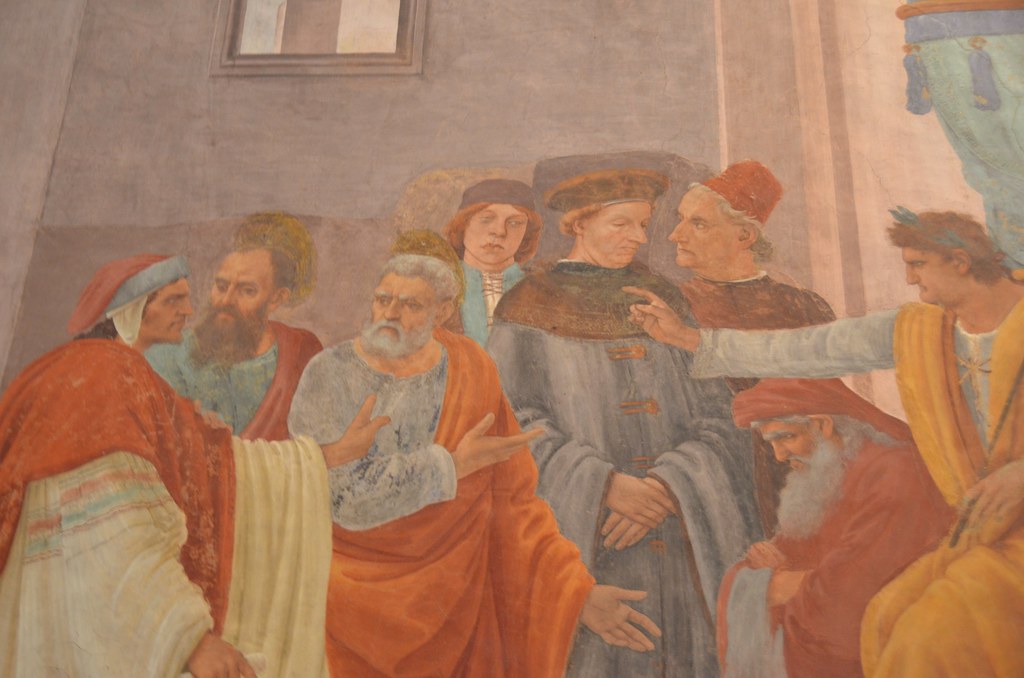Poetry by William Miller

THE DISPUTE WITH SIMON MAGUS (after Filippino Lippi) The apostles walk in lock step, red-capped and wearing long Florentine robes, their eyes steady with purpose. But he looks between them: cropped black hair, long aquiline nose, almond eyes that probe for more than wisdom in a leather-bound missal. One in three, the third member of the trinity—man’s soul curious beyond silver clouds, the harps of heaven, doesn’t believe in a bended knee or simple names for an ancient mystery: “Jesus,” “Jehovah,” “I AM.” Simon Magus carried in his black heart the beat of God’s favourite angel, all the secrets he knew inside locked iron gates. From his grave grew a tree of unforbidden fruit, the pulpy juice sticky and sweet as poison that does everything but kill. Clerics walk in lock step and never purchase with a bag of gold florins the miracle of healing a withered hand, the secret of daily resurrection. Simon’s dark eyes look into ours asking only that we seek and find, knock and open the door that leads to a downward staircase, treasures the king hordes only for himself. FULL IMMERSION The first in my Sunday school class to walk down, answer the altar call by myself, I was only twelve. Only twelve but growing into a gray, confused age. My father drank vodka from a flask in the church parking lot; my mother was a perfumed ghost with blood-red nails, there and not there. I didn’t believe in Jesus or the grim preacher, the pious rednecks in folding chairs who ate saltine crackers and sipped warm grape juice from shot glasses once a month. I hated hymns, never wanted to join the faithful on a “Beautiful Shore” or stand like a cheated fool at the foot of the “Old Rugged Cross.” But I liked the water rite, hoped to drown and come up someone else reborn with wings to fly away from the new brick church with modern stained glass. My only ticket out was dying in a tank behind the altar, chlorine water in my nose and lungs after being dunked three times. And on that day, two Sundays later, I wore a choir robe and rubber boots, took three steps down into the blue-green lukewarm water. The preacher pinched my nose and held me deeper when he called down the Holy Spirit. It didn’t work, not then or now, not death enough but something different for a few drowned seconds, heart pumping hard from lack of air. My robe was soaked, my hair wet and pasted to my forehead. The organ cranked out “Amazing Grace” as if I were saved, a child sinner come home. MY NEIGHBOUR IS A DEMONOLOGIST He once told fortunes on the square but made no money. Our super, he wears a black wifebeater t-shirt with a white upside-down cross and the angry words across his chest: “Hail Satan!” Never, unless it was a third-time request to fix a broken smoke alarm or leaky pipe, did he speak to anyone, his face hidden behind long dirty-blonde hair. Kittens in his window looked out all day with sad eyes— my next-door neighbor, a drunken bartender, swore he sacrificed them, one by one, to the Devil. Not until the hurricane that blew our lights and AC out for eight days and three hours, the temperature over 100 degrees, did his sallow skin start to crack. He told me at midnight in the courtyard that he wanted to go home to Indiana, buy a farm and live with cats he didn’t raise to sell to the best owners he could find. He loved their mystery, their silence. New Orleans had chewed him up. The mosquitos alone made us all victims, the water we had to boil for thirty minutes before we drank it, took a bath or washed our hands. He was robbed for his shoes and belt, stepped on a dirty needle walking home. He wanted to see the seasons change, watch the leaves tumble down and die a slow, lovely death. Twenty miles from the nearest church, he’d live alone, and never care if the moon meant anything more than light between the trees or on the grass— twenty miles from any cross, upside down or not.
William Miller’s eighth collection of poetry, Lee Circle, was published by Shanti Arts Press in 2019. His poems have appeared in many journals, including, The Penn Review, The Southern Review, Shenandoah, Prairie Schooner and West Branch. He lives and writes in the French Quarter of New Orleans.
.
PLEASE NOTE: ARTICLES CAN ONLY BE REPRODUCED IN OTHER SITES WITH DUE ACKNOWLEDGEMENT TO BORDERLESS JOURNAL